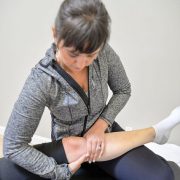Spooky creaks and cracks coming from your knees?
Do your joints crack or make noises every time you move a certain way?
If you’re like most people, these noises concern you. Does it mean something is wrong with your knees? Are your joints deteriorating? What happens if it continues? First of all, cracking in your knees (as well as your other joints) is quite common, and most of the time there’s a reasonable explanation for it.
Crepitus is the term used to describe any grinding, creaking, cracking, grating, crunching, or popping that occurs when you move a joint like your knee. You can experience this at any age, but it’s certainly more common as you get older.
So what causes crepitus and should it be a concern?
The most common causes of crepitus include air bubbles popping inside your joint, tendons or ligaments snapping over your joint’s bony structures, or the degeneration of your joint’s cartilage that generally occurs with arthritis. You may experience uncomfortable sensations, or even a tiny bit of pain when this happens, but in most cases, none of this should scare or concern you.
It’s all a normal part of aging and wear and tear.
But if the cracking in your joints starts to become more regular, is accompanied by joint swelling and more constant pain, or if the cracking turns to “clunking” and your knee starts to feel unstable – then you’re smart to be concerned and it’s possible something more serious could be going on. In this case, get your knees checked out by an expert.
Assuming you haven’t let your knees get to the “concerned stage” yet, and the most annoying thing to you right now is the cracking, grinding, or crunching – there are things you can do to minimize this problem and prevent it from getting worse.
The best way to minimize these noises is to keep moving.
Motion is lotion. Regular movement throughout the day keeps your joints lubricated – kind of like applying WD-40 to a creaky door hinge. You also want to make sure your biomechanics are sound. If you’ve got imbalances between your muscles and joints, it will impact the way your joints move and function, causing more creaking and cracking.
For example, let’s say your hips are on the weak side. How your knees tolerate various activities depends a lot on how strong your hips are. I’ve experienced this firsthand. I love to hike. And if my hips aren’t doing their part, I feel the entire hike in my knees, especially on the way down. And you know what else happens? My knees crack a lot more on the days after I hike.
The imbalances in my body cause more stress on my knees and the result is they crack a lot more. Now, as I mentioned previously, this isn’t a big concern for me yet. My knees don’t hurt – they are just very noisy. However, I make a conscious effort to regularly stretch my quads, and strengthen my hips and core, so that I can keep this problem at bay and not let it get worse.
Moral of this story
The “spooky” noises in your knees are often quite normal – and not just a Halloween prank. However, there are things you can do to minimize this, and you want to pay close attention to make sure those noises aren’t progressing into something more serious.
If you notice more cracking and crunching during or after certain activities, like with me and my hiking, then it’s an opportunity for you to get ahead of it and work on some of the imbalances in your body that could be contributing to this. And of course – get moving. In so many cases, movement can be your medicine, and help you avoid something like procedures or surgery as the solution instead.
Are you a local in Portsmouth, NH? CLICK HERE to talk to one of our specialists and get a full joint and movement analysis of your knees to fully explore the “spooky” creaking and cracking.
Dr. Carrie Jose, Physical Therapist and Pilates expert, owns CJ Physical Therapy & Pilates in Portsmouth and writes for Seacoast Media Group. To get in touch, or get a free copy of her guide to knee pain, CLICK HERE or call 603-380-7902.



